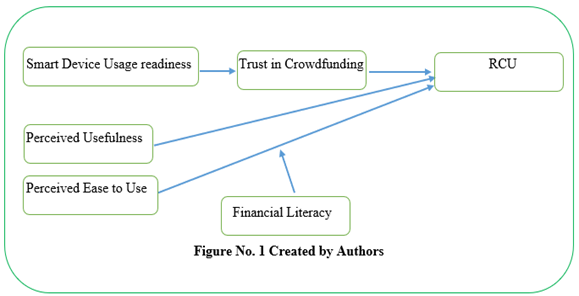ADOPTION OF REWARD-BASED CROWDFUNDING IN THE DIGITAL ERA: EXAMINING THE ROLES OF USER PERCEPTIONS, TECHNOLOGY READINESS, TRUST, AND FINANCIAL LITERACY
DOI:
https://doi.org/10.71146/kjmr554Keywords:
Reward-based Crowdfunding, Perceived Usefulness, Perceived ease to use, Smart Devices Usage Readiness, Trust, Financial LiteracyAbstract
This study investigates the adoption of reward-based crowdfunding platforms by examining perceived usefulness and perceived ease of use, while also capturing the moderating effect of financial literacy and the mediating role of trust in crowdfunding. Data were collected from a questionnaires with 330 valid responses from private sector educational institutions. Firstly, Cronbach’s alpha and composite reliability tests were employed to assess data reliability, along with the Fornell-Larcker criterion for ensuring discriminant validity. Furthermore, PLS-SEM approach through SmartPLS 4.0 was used to analyze for direct, indirect and moderating effects. In the light of Technology Acceptance Model (TAM), the results reveal that perceived usefulness and perceived ease of use exert the significantly positive influence on reward-based crowdfunding usage. Additionally, smart device usage readiness indirectly affects reward-based crowdfunding through the mediating role of trust in crowdfunding, underscoring that technological readiness must be coupled with user trust to drive engagement. The study also confirms that financial literacy moderates the connection between perceived ease of use and reward-based crowdfunding, suggesting that users with higher financial literacy derive larger benefits from user-friendly platforms. These insights highlight the multi-dimensional nature of crowdfunding adoption, where technological functionality, user trust, and financial competence interact to shape platform engagement. The results offer strategic implications for enhancing participation in crowdfunding, particularly in emerging digital economies.
Downloads

Downloads
Published
Issue
Section
License
Copyright (c) 2025 Muhammad Yasir Tahir, Muhammad Sadiq Shahid, Khawar Naheed, Muhammad Nasir Jamal (Author)

This work is licensed under a Creative Commons Attribution 4.0 International License.






